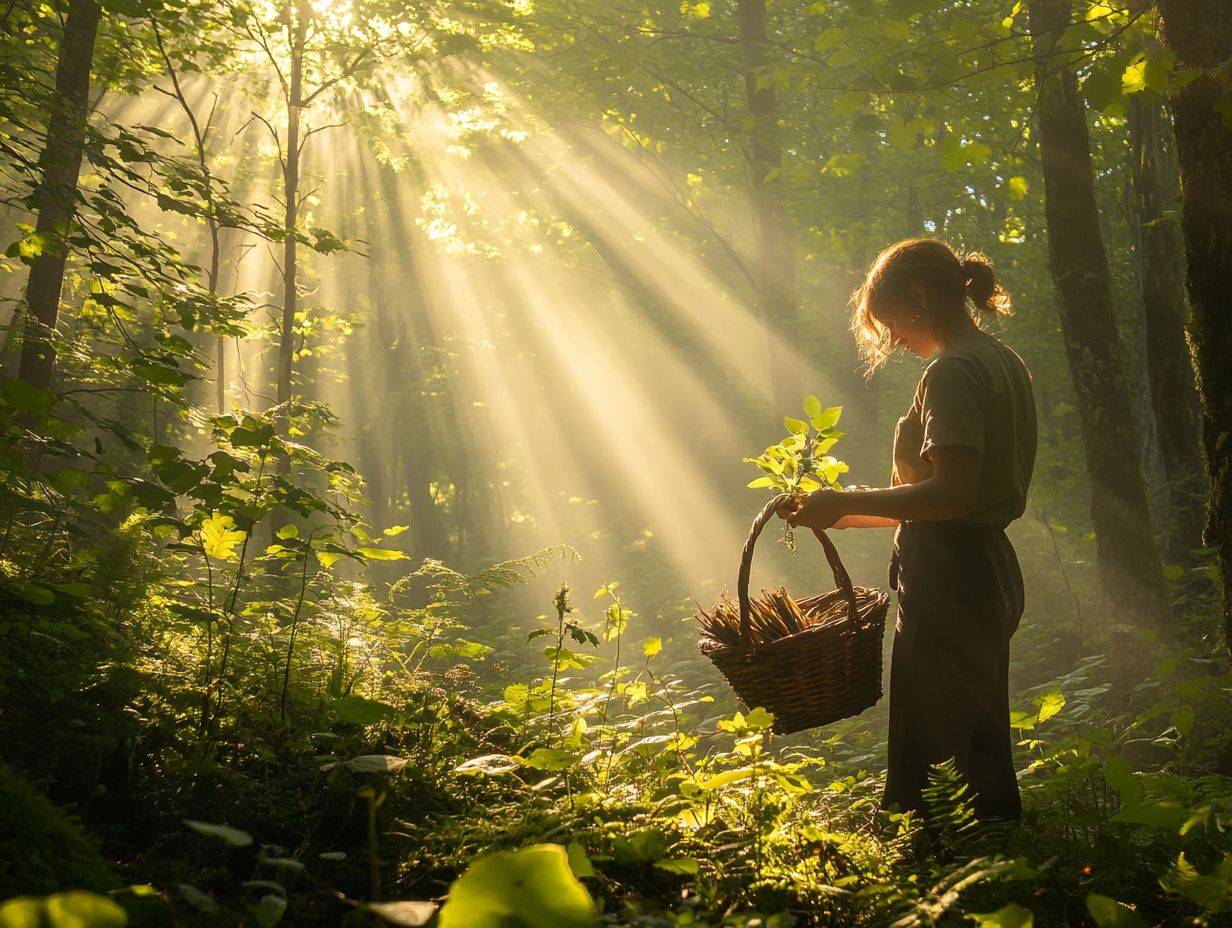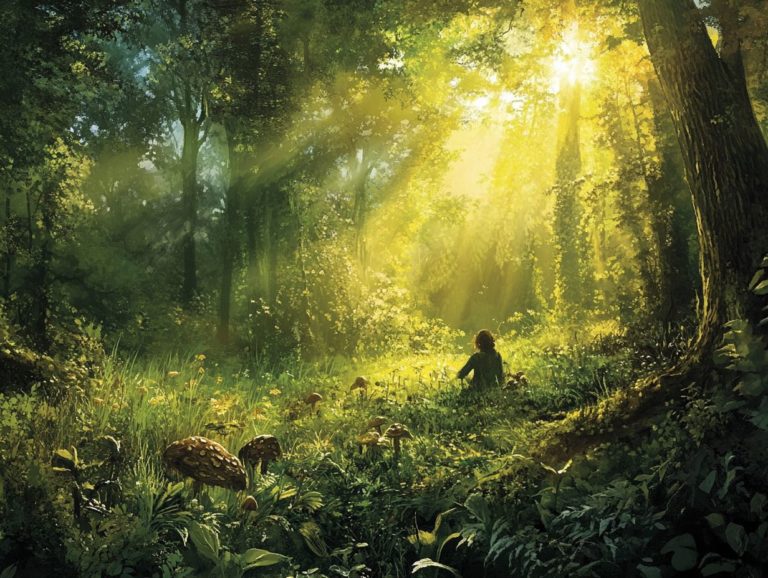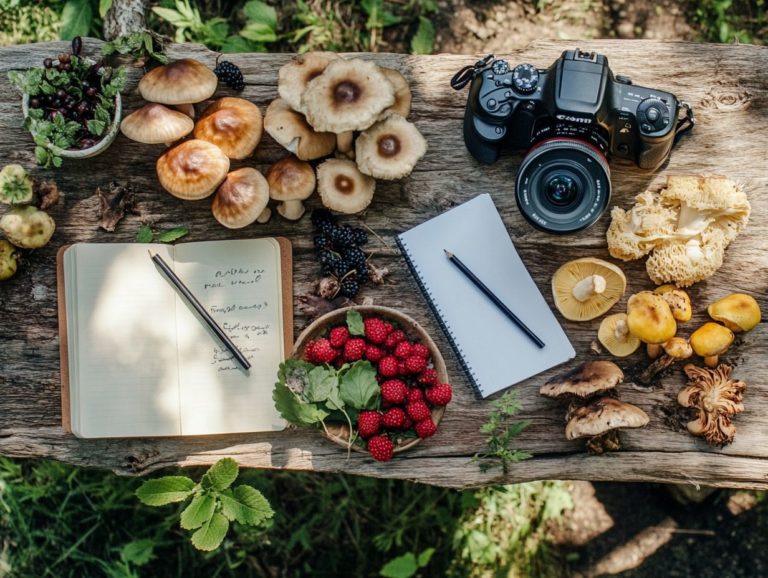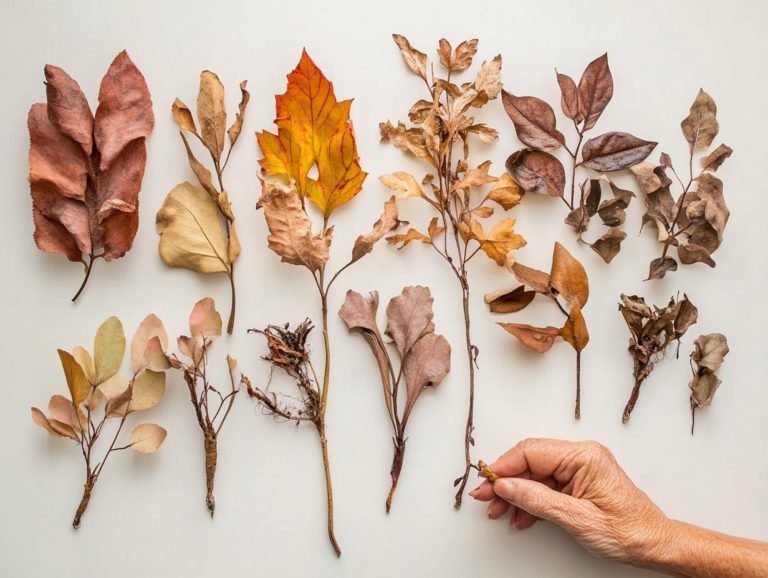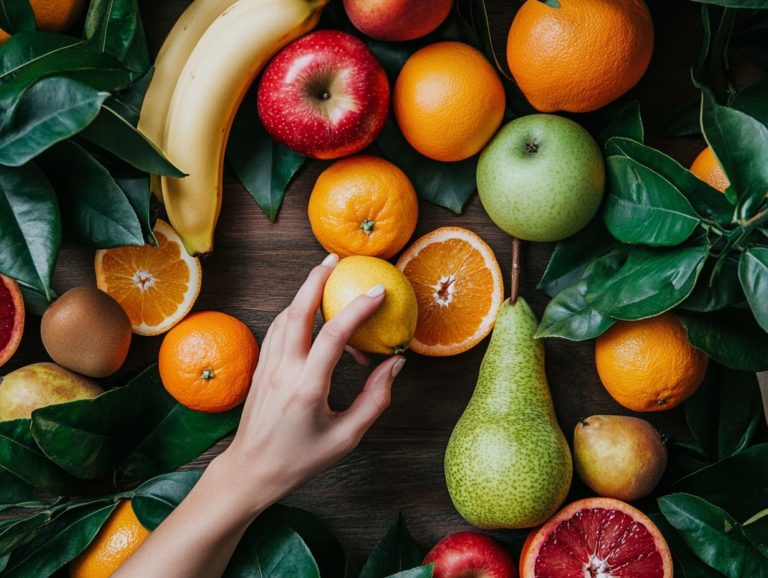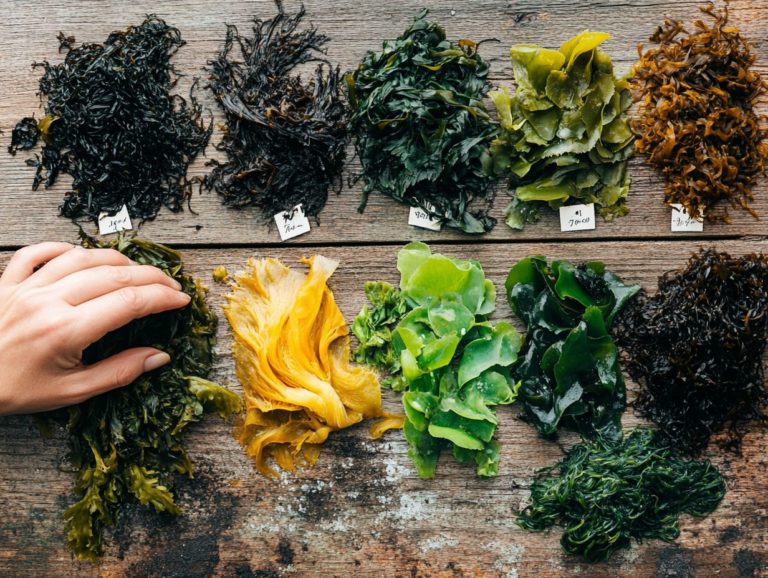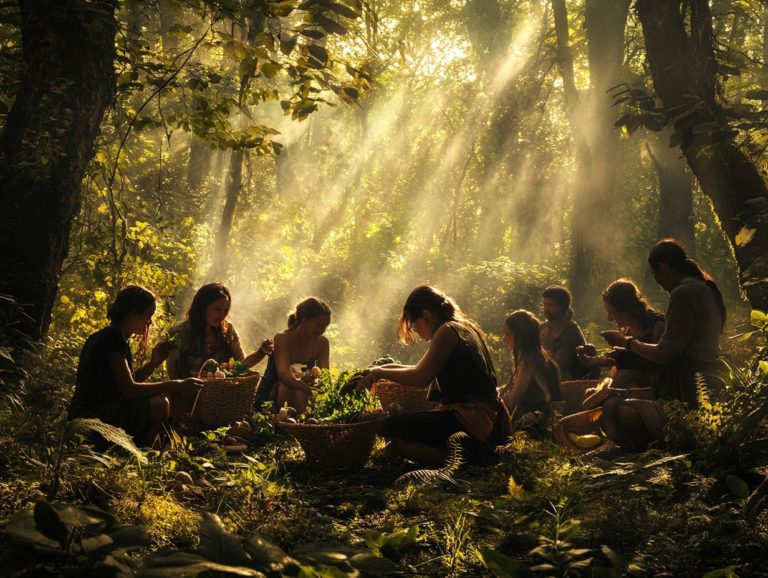What Should I Know About Foraging Ethics?
Foraging goes beyond simply gathering wild edibles; it represents a practice rooted in ethics that shapes your relationship with nature. This includes important aspects of urban foraging and wildcrafting.
Understanding foraging ethics empowers you to harvest responsibly. You honor both the environment and the rights of others while considering the importance of food sovereignty, which means communities have the right to control their own food systems.
This article will inspire you to embrace ethical foraging! It highlights the effects of ethical practices on ecosystems and offers guidelines for respecting private property and protected areas. You ll find insights from The Forager s Harvest and the National Audubon Society.
By following proper etiquette and techniques, including effective foraging tips, you can enjoy the joys of foraging while safeguarding our natural world for future generations.
Contents
- Key Takeaways:
- Understanding Foraging Ethics
- The Importance of Foraging Ethics
- Ethical Considerations for Foraging
- Endangered Species and Protected Areas
- Foraging Etiquette and Best Practices
- Proper Identification and Harvesting Techniques
- Leaving No Trace
- Resources for Learning More about Foraging Ethics
- Frequently Asked Questions
- Here s what you should know about foraging ethics?
- Here s what you should know about the importance of foraging ethics?
- Here s what you should know about basic foraging ethics?
- Here s what you should know about regional foraging ethics?
- Here s what you should know about the cultural significance of foraging?
- Here s what you should know about the dangers of foraging?
Key Takeaways:
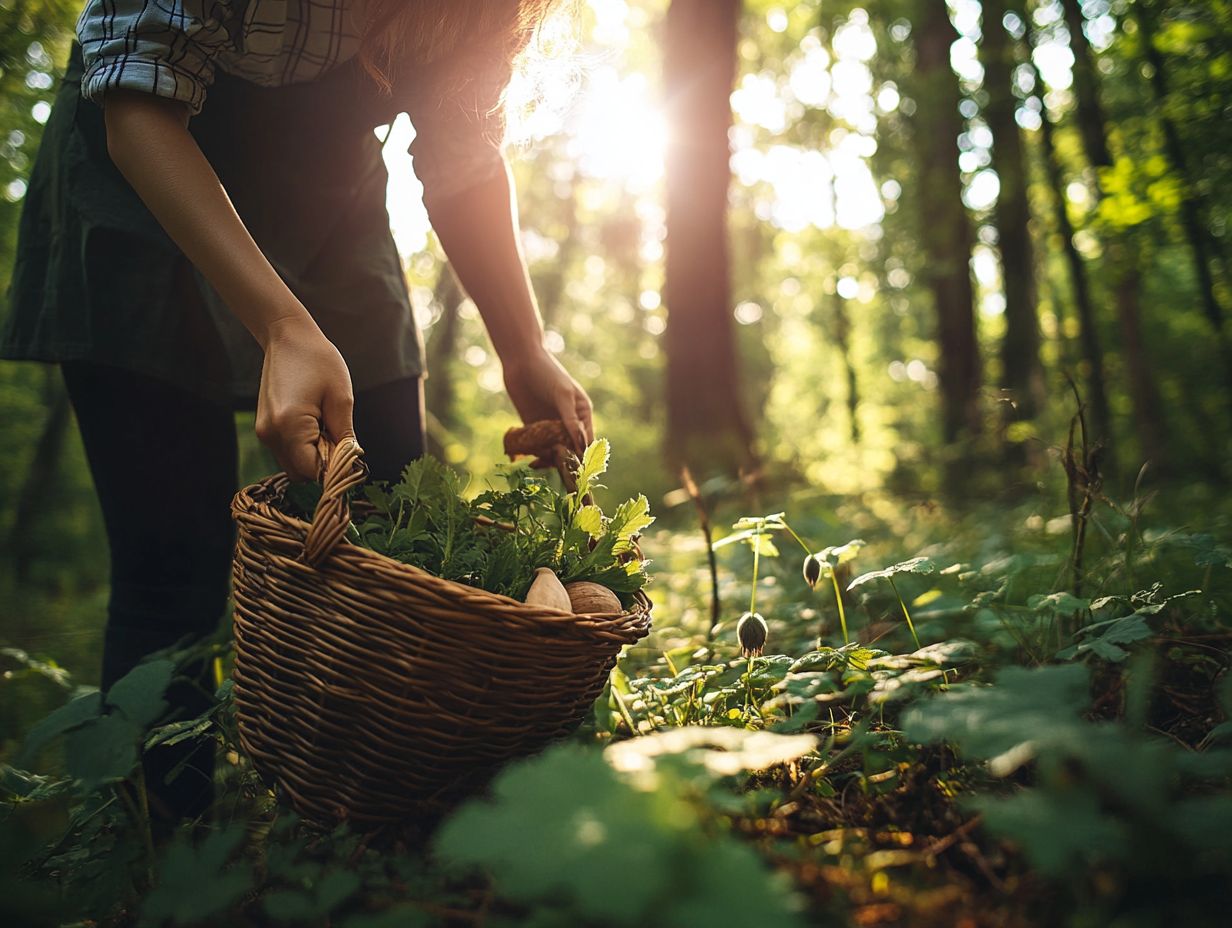
- Foraging ethics involves responsibly gathering food from the wild while minimizing harm to the environment and respecting property rights, especially concerning endangered species.
- Adhering to foraging ethics is crucial for preserving natural habitats and protecting endangered species from overharvesting, particularly in areas affected by food deserts.
- Proper identification, minimal impact techniques, and educating oneself about heirloom plants can help promote sustainable and respectful foraging practices.
Understanding Foraging Ethics
Understanding foraging ethics means respecting nature and honoring Indigenous cultures. It also involves a strong commitment to sustainable practices. As a forager, engage in activities that promote food sovereignty and uplift local ingredients and communities.
This exploration emphasizes the significance of ethical practices, especially in urban settings like Portland, Oregon. Here, you can reconnect with Indigenous cultures and draw inspiration from trailblazers like Alexis Nikole, the Black Forager. By embracing community education and raising awareness through platforms like Instagram, you can cultivate a richer connection to the land and its invaluable resources.
Defining Foraging and Ethics
Foraging is the art of gathering wild food from natural environments. Ethics in foraging encompasses the moral principles that guide these practices, focusing on sustainability, foraging safety, and respect for nature.
Unlike the predictable world of commercial agriculture, where plants thrive in controlled settings, foraging challenges you to identify diverse species like morel mushrooms within your local ecosystem. This knowledge is invaluable; it aids in recognizing edible plants and deepens your understanding of their roles within the habitat and their impact on environmental conservation.
As an ethical forager, it s important to understand the legal aspects of foraging. Be sure you have permission to harvest in designated areas. When collecting treasures like morel mushrooms, dandelions, and other local ingredients, considerate practices are essential. Take only what you need and leave enough for the ecosystem to regenerate. This thoughtful approach promotes biodiversity and preserves food sources for future foragers, including heirloom plants, keeping the cycle of nature flourishing.
The Importance of Foraging Ethics
The significance of foraging ethics cannot be overstated, especially in addressing challenges like food deserts. They play a vital role in fostering sustainable consumption and environmental conservation, particularly in urban areas facing challenges in food sovereignty.
By adhering to these principles, you contribute to a healthier ecosystem and support the sustainability of local resources, including the preservation of Indigenous communities.
Environmental Impact
The environmental impact of foraging practices can be quite substantial, shaping biodiversity and the health of the environment, and the sustainability of local resources, particularly through knowing which plants are safe to eat. This is especially true when you approach foraging with respect and adhere to safety guidelines that include understanding the local flora and avoiding toxic look-alikes.
Engaging in responsible foraging deepens your appreciation for local plants and promotes sustainable consumption practices, ensuring the protection of species like white sage. By harvesting just a small amount of a plant population, including edible plants like dandelions, you ensure their ability to regenerate, maintaining their vital role in the ecosystem.
On the flip side, unregulated foraging can lead to taking too much and habitat disruption, particularly affecting endangered species and disrupting local Indigenous cultures.
Start exploring local ecosystems and discover the beauty of nature around you! As a forager, familiarize yourself with native plant species, seasonal growth cycles, and the potential invasiveness of certain species, including various types of mushrooms. By prioritizing education and responsible practices, you can make a positive contribution to your environment while fully enjoying the rewards of wild edibles and adhering to foraging safety.
Responsible Foraging Practices
Responsible foraging practices are vital for ensuring the long-term sustainability of edible plant populations. This entails mastering proper plant identification and adhering to legal land use regulations.
By prioritizing these practices, you safeguard the plants you harvest and the ecosystems they thrive in, enhancing local biodiversity. Accurately identifying edible species is crucial, especially since many plants have toxic look-alikes, which highlights the importance of foraging safety. Familiarizing yourself with local regulations allows you to respect land management guidelines and help preserve natural habitats, crucial for protecting endangered species.
Safety should always be your priority during foraging adventures. Ensure you re equipped with the necessary tools and knowledge, like a mushroom guide, when you head into the wild. Cultivating an ethic around harvesting ensures your practices are responsible and that the environment remains intact for future generations, enhancing community education efforts.
Ethical Considerations for Foraging
When foraging, it s essential to consider ethical practices that respect property rights and safeguard endangered species, as well as designated protected areas where foraging may be restricted. By adhering to these principles, you contribute to the sustainability of natural resources and the preservation of biodiversity. This is particularly important in urban foraging contexts, where resources can be limited.
Respecting Property Rights
Respecting property rights is crucial in the realm of ethical foraging. You must be aware of legal land use and the importance of obtaining permission before harvesting on private land, particularly in areas with Indigenous communities. This respect cultivates goodwill and nurtures a collaborative spirit between foragers and landowners, promoting food sovereignty in the process.
Clear communication with property owners is essential; it establishes trust and showcases your commitment to acting responsibly, especially in light of community education efforts. By familiarizing yourself with local foraging laws, including those pertaining to protected areas, you can skillfully navigate the intricacies of each area while honoring existing restrictions.
Embracing ethical practices, such as leaving no trace and only taking what you need, fosters healthy relationships and ensures that landowners feel valued and appreciated for sharing their resources, promoting sustainability. Ultimately, these efforts pave the way for a sustainable foraging community, where knowledge-sharing and community engagement are key to success. Join the movement of responsible foragers today!
Endangered Species and Protected Areas
Consider the implications of harvesting from endangered species and avoid areas designated as protected. This promotes the ethical sustainability of natural resources, especially in urban foraging.
Preserving biodiversity depends on taking care of ecosystems where such species thrive. This includes sensitive management of local ecosystems.
Protected areas like national parks and wildlife reserves impose strict regulations to safeguard fragile habitats and their inhabitants. This is vital for protecting endangered species.
Foraging activities in these regions may be limited or require permits to ensure resources are used sustainably and adhere to local foraging laws.
Ethical foraging sustains plant and animal populations while enhancing local ecology and fostering community ties, particularly with Indigenous communities. In California s state parks, stringent guidelines foster a collaborative relationship between conservation efforts and local Indigenous communities.
Foraging Etiquette and Best Practices
Understanding foraging etiquette and best practices is essential for enjoying the rewards of wildcrafting (the practice of gathering wild plants) sustainably, especially in urban settings.
Respecting nature and local communities enhances your foraging experience, cultivating a deeper connection to local herbs and mushrooms.
Proper Identification and Harvesting Techniques
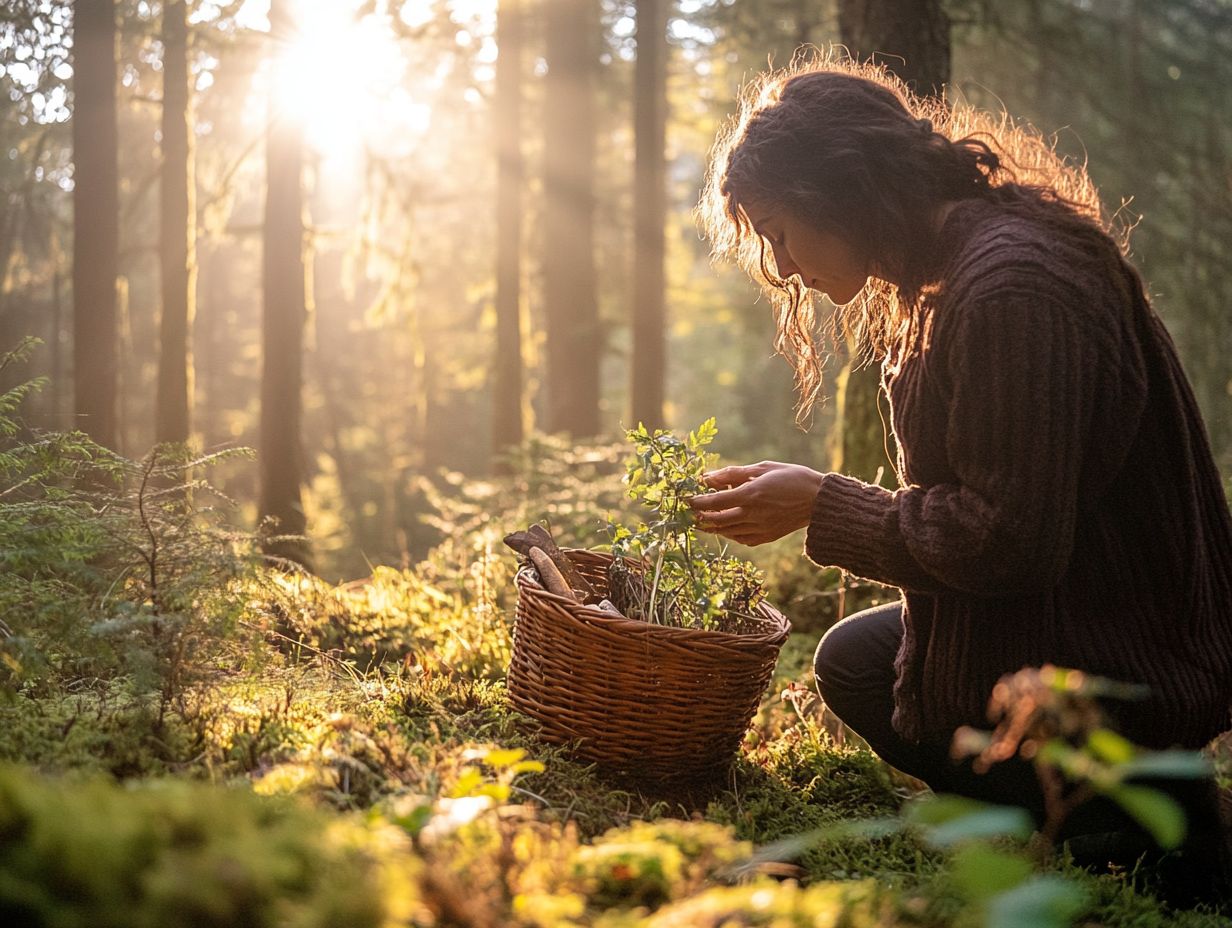
Proper identification and harvesting techniques are crucial for safely gathering edible plants like morel mushrooms. This minimizes your environmental impact while promoting sustainable practices.
Accurately recognizing edible varieties allows you to enjoy the rich flavors and nutritional benefits that nature offers, especially when foraging for wild edibles.
Embracing responsible harvesting like taking only what you need is vital for maintaining ecological balance and supporting local ecosystems’ health.
The risks of misidentification highlight the need for thorough education in foraging safety, especially regarding toxic look-alikes (plants that look similar to edible ones but can be harmful).
Understanding local flora, including Indigenous knowledge, enhances your foraging experience and fosters a deeper appreciation for natural ecosystems. Knowledge-sharing and community engagement through platforms like Instagram are essential components of this rewarding practice.
Leaving No Trace
Leaving no trace is a fundamental principle in foraging, encouraging you to minimize your environmental impact. This promotes sustainable consumption and environmental conservation.
Adopting practices that protect the delicate balance of local ecosystems ensures your foraging activities don’t harm the habitats you rely on.
Foraging in areas where species are abundant helps preserve plant populations. Being mindful of your foot traffic prevents soil compaction and erosion.
Proper waste disposal like packing out leftovers and adhering to the ‘leave what you find’ ethos contributes to these ecosystems’ health.
These responsible practices safeguard biodiversity and enhance the foraging experience for you and fellow enthusiasts.
Resources for Learning More about Foraging Ethics
Explore a wealth of resources dedicated to promoting sustainable foraging practices and fostering community education. These materials are available through various organizations.
Join local foraging groups and share your experiences to deepen your understanding of foraging ethics and become a responsible forager today!
Organizations and Educational Materials
Numerous organizations present a treasure trove of educational materials and resources centered around foraging ethics, including esteemed names like the National Audubon Society and Pacific Northwest Foraging, along with influential advocates such as the Black Forager.
These institutions offer a wealth of information, including field guides, workshops, and online courses that delve into sustainable practices and the intricacies of local ecosystems. For instance, the National Audubon Society provides insightful articles and practical tips on identifying wild edibles while ensuring minimal impact on natural habitats. Pacific Northwest Foraging also offers hands-on classes, allowing you to connect with nature and grasp the significance of ethical harvesting.
Community education programs often bring in local experts to share their wisdom, helping beginners learn and develop their skills responsibly.
Frequently Asked Questions
Here s what you should know about foraging ethics?
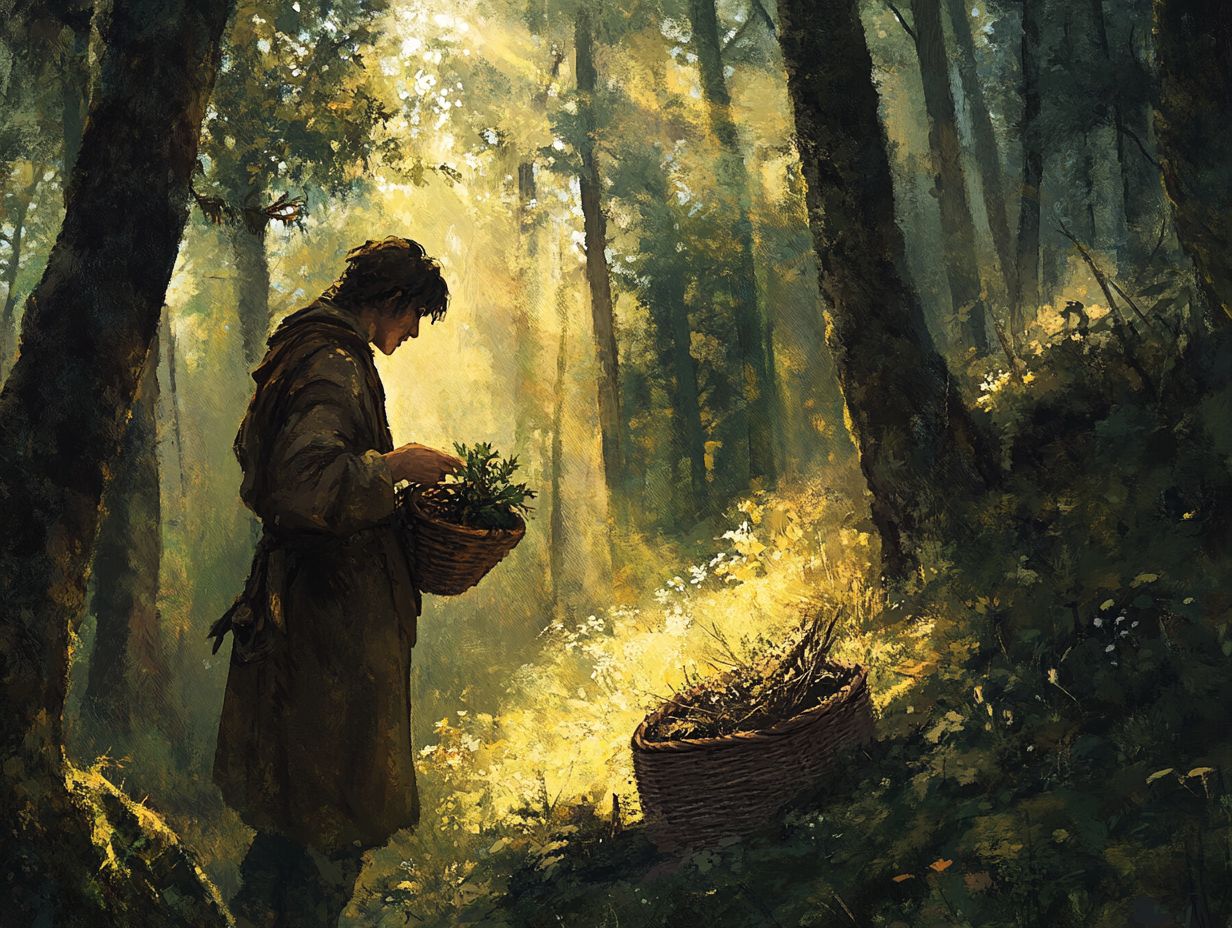
Foraging ethics are the rules for collecting wild food without harming the environment. To forage responsibly, it’s also important to understand the legalities of foraging.
Here s what you should know about the importance of foraging ethics?
Foraging without considering ethics can negatively impact the environment, including overharvesting, destruction of habitats, and disturbance to wildlife. Understanding and following foraging ethics helps preserve the natural balance of ecosystems.
Here s what you should know about basic foraging ethics?
Some basic foraging ethics include respecting the land and resources, only taking what is needed, leaving enough for wildlife and other foragers, and properly identifying and correctly harvesting plants.
Here s what you should know about regional foraging ethics?
Yes, foraging ethics can vary depending on the location and local regulations. It is essential to research and understand the specific ethics and laws of the area you plan on foraging in.
Here s what you should know about the cultural significance of foraging?
Foraging has been a practice for humans since ancient times and has played a significant role in many cultures and traditions. It is important to respect and honor the cultural and historical significance of foraging when practicing it.
Here s what you should know about the dangers of foraging?
Yes, there are potential dangers associated with foraging, such as encountering poisonous or harmful plants, wildlife, or trespassing on private property. It is important to educate yourself and take necessary precautions before foraging.

